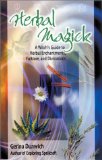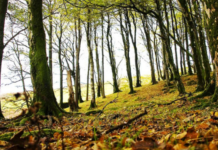
Herbal Magick: A Witch’s Guide to Herbal Folklore and Enchantments
, by Gerina Dunwich
New Page Books, 1564145751, 2002
Herbal magick is not an area I had paid a lot of attention to until about a year ago. Being friends with a well-trained herbalist, I had come to rely on her when I needed guidance (I still do to a large degree). When my health and the health of my wife began to deteriorate, however, I became more aware of the subject. I still called upon my fiend for the mundane use of herbs, but I began to look into the magickal aspects of herbs.
This book is not an herbal. It is designed primarily as a reference work, so don’t go into it expecting to be entertained and regaled with anecdotes. The entire second half of the book serves as a reference work. This alone would be worth the price of the book.
Ms. Dunwich is coming from the standpoint of a traditional Witch, with none of the vacillation of many who claim only to be Wiccan, and hence incapable of knowing (or using) the darker knowledge which has been part of the Craft for so long.
Just to make sure you don’t miss the occasional warnings about toxicity and other potential problems, Ms. Dunwich uses boldface. She is very aware of, and makes the reader aware of, the potential “nasty” uses of some of the herbs she includes in this book. While not advocating their use, she does not deny their potential for mischief, thus placing the burden of their use squarely where it belongs – on the shoulders of her readers. By placing the warnings prominently in the text, as opposed to buried in footnotes or appendices, she assures herself that no one can later claim, “Oh, I didn’t see the warning. I didn’t know that herb was potentially dangerous.”
Ms. Dunwich is clear in his distinction between religions (which she, properly, capitalizes) and magickal practices (which she does not). While not a major point, and totally unrelated to the subject of the book, it is one that marks, in my opinion, a decently educated writer.
She lists basic dream interpretations, elemental correspondences, and correspondences to deities and planetary rulership. She tells you where you can purchase herbs for your own work. She also has a basic list of deities from many traditions and pantheons.
Her Appendix lists herbal references for many of the days of the year.
This book should, in my opinion, find a place in every aspiring herbalist’s bookshelf. It would also fit into most other Pagan’s reading list and bookshelves. The writing is crisp, the style is entertaining, and the overall impression I carried away from the book was one of having spent a pleasant time talking with an old friend, and learning more than I had expected to when I started out.








